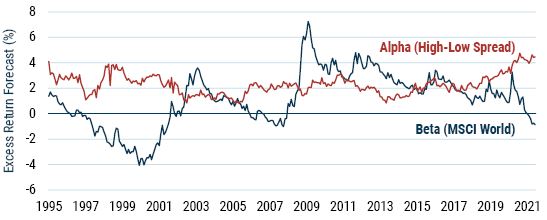Has alpha become disproportionately important to beta? At GMO, we think it has. In fact, the forecasted potential return to alpha on our data is the highest we have observed in nearly 20 years.
When generating returns in portfolios, active managers have two levers. The first of these is beta, the returns to markets from passive investing. The second of these levers is alpha, the returns above or below market returns, generated by finding mispriced securities. In classical portfolios, the returns to beta have always claimed the most attention and focus. For example, when we classify portfolios we often think about them as being defensive, balanced, or growth oriented. Through history, academics and industry practitioners have puzzled over the relative importance between the asset allocation and the alpha generation.1 However, in a world of inflated asset prices, should we not question this conventional wisdom? Should beta continue to take centre stage? Are the returns to beta going to be sufficient going forward, or should investors be paying more attention to alpha?
GMO’s Systematic Global Macro (SGM) team can apply its expertise to evaluate and answer these questions. Our team has worked together since 1999, consistently applying a process that systematically identifies long/short relative value opportunities across global equity, fixed income, currency, and commodity markets. Our value process is based on the long-term expected return forecasts we create for every market in our universe and is complemented by sentiment to help time the implementation of our positions. Since inception, this approach has delivered strong excess returns while also providing a low correlation to conventional asset classes and macro hedge funds.
By examining value forecasts based on our long-term forecasts used in the SGM process, we can see that the comparative opportunity set between macro alpha and beta has substantially changed. In today’s world, we believe investors need to rethink the optimal proportionality between alpha and beta.
To illustrate this, starting with equities, we created a forecast return to macro equity beta, or the forecast return to the MSCI World. This forecast was constructed by creating a market-cap-weighted average of the country level equity value forecasts used in the SGM process. These value forecasts are based on mean reversion and are designed to have a horizon of 7-10 years.
To assess the opportunity set available from macro equity alpha we looked at the spread between forecasts. To do this, we ranked the countries and regions we actively trade in the SGM Strategy by valuation from the cheapest market, the FTSE100 (UK), to the most expensive market, the S&P 500 (US). We then compared the difference between the forecast for top- and bottom-half (weighted by market cap) markets over time. Intuitively, the higher the forecast differential, the greater the potential returns, or alpha, from long/short equity positions. The results are shown below.
SGM Macro Equity Alpha: Cross-Country Value Forecast – Highest in 20 Years
Equity Value Forecast: Alpha vs. Beta Opportunities

Source: GMO | As of June 30, 2021
The chart represents local, real return forecasts for several asset classes and not for any GMO fund or strategy. These forecasts are forward-looking statements based upon the reasonable beliefs of GMO and are not a guarantee of future performance. Forward-looking statements speak only as of the date they are made, and GMO assumes no duty to and does not undertake to update forward-looking statements. Forward-looking statements are subject to numerous assumptions, risks, and uncertainties, which change over time. Actual results may differ materially from those anticipated in forward-looking statements.
So, what do we note? The spread of our forecasts (alpha) is in stark contrast to our combined (beta) forecast for global equities. The return potential associated with macro equity alpha is the highest we have seen since we launched the SGM Strategy in March 2002. This spread has widened further because the damage from Covid-19 has affected countries differently, depending on the varying compositions of the underlying economies and the speed and effectiveness of policy responses. In contrast, equity valuations have been inflated everywhere, again, partly because of Covid recovery policies. These extreme valuations have contributed to negative forecasted returns to equity beta; one of the lowest return opportunities we have seen since the Strategy’s inception. In historical terms, the opportunity set in macro equity alpha is disproportional to that in macro equity beta.
We also see a similar pattern for global bonds. In a world of negative real yields, we forecast the return to global bonds to be negative over 7-10 years. In contrast, against the same history, we see the spread in bond forecasts wider than average. Again, alpha appears to be becoming more important relative to beta across asset classes.
Many investors (including GMO; in fact, particularly GMO) have been focused on the return potential of the Value trade. Value stocks (i.e., the cheaper half of the market based on valuation metrics like Price/Book and Price/Earnings, otherwise known as “Style Value” groups) are trading at the widest discount since the Internet bubble. However, being exposed to stock level value may not capture the same opportunities as country level value dislocations. We believe diversified portfolios could stand to benefit from exposure to both factors, which has important implications for investors. The potential beta returns of our two basic assets, equities and bonds, look to be extremely meagre going forward. As such, generating returns for a standard balanced portfolio looks to be extremely challenging. Yet within both asset classes, the spreads in macro forecasts are particularly attractive: opportunities are out there.
While investors may be focused on the Style Value factor, we encourage them to not overlook an equally attractive and diversifying opportunity in macro alpha.
Download article here.

